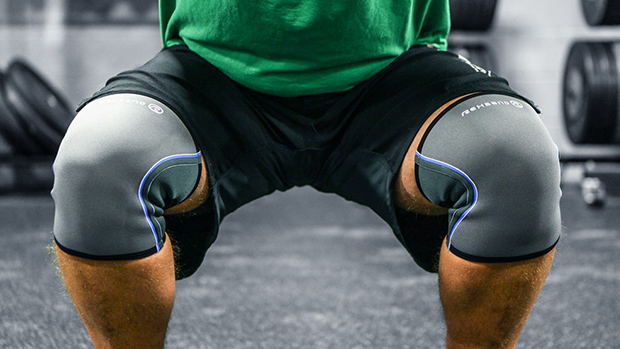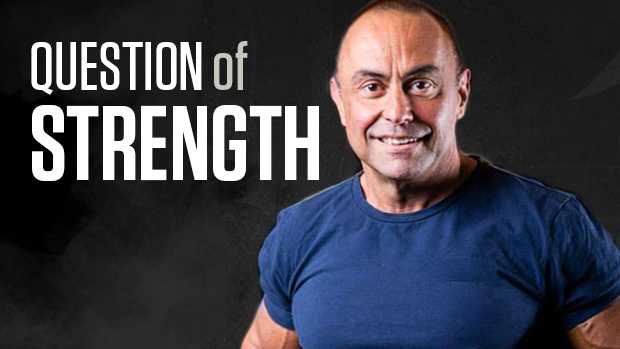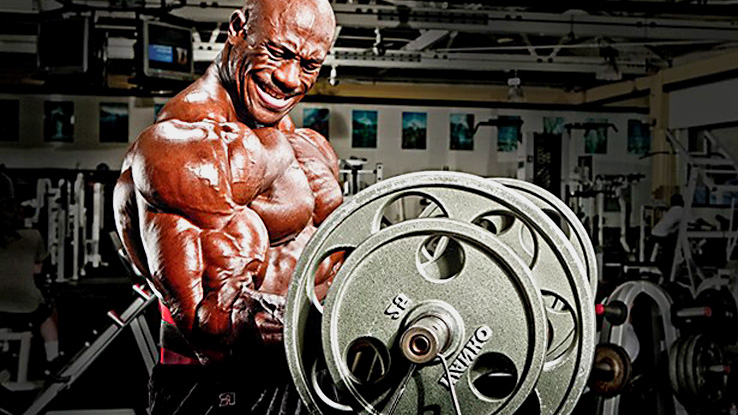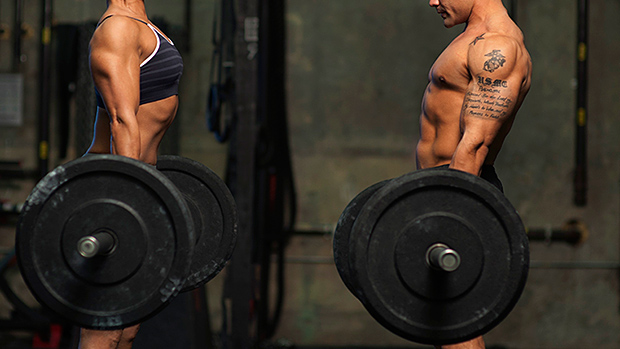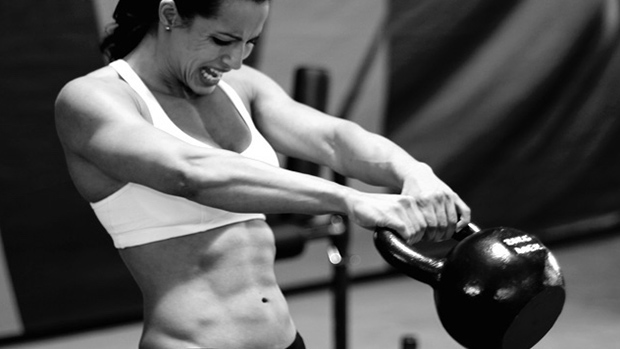Having a bum knee sucks, so I decided to come up with a bulletproof plan to get your knees feeling healthy and working as well as humanly possible.
Wait! Were you about to X out of this article already? Maybe go check and see if any new hotties have posted their photos elsewhere on the site? Well, don't. Why? Because you don't want to go through this, do you?

I didn't think so. Yes, this article is about knee health. No, that's not as sexy as biceps and big bench presses, but maybe I can scare you into caring with the photo above.
You see, a year and a half ago, I had perfectly healthy knees, and I was coming off the best training cycle of my entire life. Long story short: A ski trip led to an arthroscope and a knee that may never return to normal.
Fixing knees is my business. I've studied their architecture, how they function, the most cutting edge research, common injuries, and what the best and the brightest in the industry are doing to fix even the most stubborn knees. I'd love to say I'm doing it all for you, but obviously there's a little self-interest involved here as well!
If you've ever had a knee injury, this is the article for you. I'm going to get you up-to-speed with some new concepts (along with reviewing some old ones) that are sure to get your knees as healthy as possible.
Never had a knee injury? Then this is an even better article for you. If you follow the ideas here, you'll be a lot less likely to have a knee injury in the first place.
Eighteen Tips for Bulletproof Knees
I'll make this first one easy on you. Go out, buy some knee sleeves, and wear them every time you train your legs.
This could be quad-dominant day, hip-dominant day, "leg" day, or whatever you want to call it. Just put them on before the workout, warm-up thoroughly, and bask in the joy that healthy knees bring to you.
This idea is beautiful in its simplicity, yet often ignored for various reasons such as "I'm in a hurry" or "I don't need to warm-up because I'm 22 and therefore ten feet tall and impervious to harm." Well, I'd love to see what that lack of warm-up is doing to your joints, pal!
Beyond improving your training performance for numerous reasons, warming up reduces the viscosity of synovial fluid (the stuff that fills your joint space), providing better lubrication and healthier joints in general.
It may sound counterintuitive, but when we have knee issues, where do we focus most of our attention? The knees, right? You know what else? That's a big part of the problem!
The fact of the matter is that knee issues are typically due to issues at other areas of the body, not the knees themselves. Lack of hip mobility in all planes can not only lead to knee pain, but back pain as well. Eric Cressey and I covered about a zillion hip mobility exercises in our Magnificent Mobility DVD, so I'd highly suggest checking it out.
However, one area we didn't cover as in-depth was ankle mobility, and this area is often poorly addressed, or worse yet, not addressed at all! After reviewing Mike Boyle's Functional Strength Coach DVD series, I realized how poor sagittal plane ankle mobility is in many athletes. Here are some drills to help out:
In the first exercise, all you're going to do is set up next to a wall with your feet a few inches away from it (you may even want to start with your toes touching the wall at first). Rest your hands on the wall, place all your weight on your heels, and then stay tall and try to "shoot" your knees over your toes.
In this second exercise, you're going to place a small board underneath your toes to put you into a dorsiflexed position. I find it easiest to place this board in front of the wall so you can balance yourself with your hands.
While staying tall, you're again going to try and "shoot" your knees over your toes. Don't worry if there isn't a ton of range of motion at first; it'll improve as you practice it.
This is another area that not nearly enough of us are addressing, as most who have patello-femoral pain are only worried about isolating the vastus medialis obliquus (VMO).
In research by Ireland et al. (1), they found that athletes with patello-femoral pain had significantly decreased strength in both hip abduction and hip external rotation. How much is significant? These subjects were 26% weaker in hip abduction and 36% weaker in hip external rotation!
Now that we know what movements to train, what muscles are most affected? Specifically, we're talking about getting your gluteus maximus and posterior fibers of the gluteus medius firing. So before we do low-body work, we should be getting some activation work in to make sure those muscles are stimulated and ready to go. X-Band walks are perfect here.
You'll see in the video that the set-up is a little funky, so hopefully seeing it will make it easier than me trying to explain it! Big things to focus on here include turning the toes out slightly and bracing the core throughout. This will prevent you from using the "Weeble-Wooble" substitution pattern that typically occurs in hip abduction movements. Stay tight, tall, and use those glutes and you should be just fine.
In maintenance phases (where I'm focusing on max strength), I may only do one set before training. In phases where motor control and recruitment are the priority (for instance, in the early off-season or a transition phase), I may perform three or even four sets of these exercises before training.
A lot of athletes and lifters are interested in getting that VMO to fire, especially those with patello-femoral (PF) pain. This anterior knee pain, in many cases, is due to soft-tissue imbalances between the stronger/tighter lateral knee structures and the weaker/inhibited medial knee structures (the VMO). This muscle imbalance leads to a lateral (outside) pulling of the patella into the femoral condyle, resulting in knee pain.
The obvious solution here would be to isolate and then strengthen the VMO, but it just doesn't seem to be that easy. In fact, there doesn't appear to be any true VMO "isolation" exercises. Sure, terminal knee extensions (TKEs) hit the VMO, but it's not "isolated."

In an article discussing muscular control of the patella, Malone et al. (2) flat out state, "The concept of VMO isolation through specific exercise should no longer be part of our lexicon."
Instead, I feel a more comprehensive plan of attack is necessary. For instance, a comprehensive patello-femoral pain program could include any (or all) of the following:
- Foam rolling of the lateral structures (primarily the vastus lateralis and iliotibial band)
- Direct soft tissue work (e.g. massage/ART) for the lateral structures (all of the above plus the lateral retinaculum)
- Improving general quad strength (via quad sets, leg extensions etc.) TKEs could definitely be part of the program; just understand they aren't a true isolation exercise.
- Improving the motor control and strength of the gluteals
- Stretching the quads and calves
It should be noted that each and every knee is different, requiring a specific and individualevaluation and treatment program. I'm not trying to rehab people here, rather help them prevent the need for rehab! However, I just don't see the need for direct VMO "isolation" exercises in that treatment program, as their use hasn't been justified in research at this point in time.
I'm still shocked at how many people don't adhere to this rule. They'll squat, then lunge, then do leg extensions, and then maybe get some hamstring work in if they aren't totally wiped at the end of their workout.
If you don't follow this rule, your knees may not hurt now, but I can guarantee they will in the future! When I say that we have to balance your training, we aren't talking within the training day or even the training week. You need to address the long-term health of your body when you lay out your programming! Don't just plan one cycle, follow it, and then forget about it when planning the next one. What you did (or didn't do) in this cycle directly affects ensuing cycles.
So if you did a ton of quad-dominant work in one cycle, you better make up for it with some serious hamstring and glute dominant work down the line. As Alwyn Cosgrove always says, "Time magnifies all programming errors."
This is the simplest tip I'll give, but for whatever reason people still fail to listen to their body and grasp the concept: If it hurts, stop doing it! This can include squatting, lunging, running, playing basketball, or any other pain-provoking activities.
Your second grade PE teacher could give you the same advice. Remember that sometimes taking an extra day or two off isn't a bad thing if you can train harder (or pain-free) the next time around. As well, there are also those times when you need to take a step back and work toward a total-body overhaul. If your body has been functioning in an ineffective fashion for a long time, it can take some time to get things sorted out. Take the time sooner rather than later to do this.
Each and every time you step in the gym you need to work on being better, and if you're injured, that just can't happen.
Most of the time, isolation exercises totally suck, especially if strength and/or performance are your primary goals. However, in a rehabilitation setting the rules can, and need, to change.
Following my knee scope, I started back into training with basic proprioceptive exercises, working on regaining mobility, and then progressing back into single-leg exercises. Problem was, my quads were flat-out weak. Just like any other time one muscle is weak, another one is forced to compensate. So by not isolating my quads, I was reinforcing another muscle imbalance.
So I begrudgingly got on the leg extension machine and watched myself struggle with 40 pounds. Seriously, I'd rather have a bullet in my head than be seen struggling with 40 pounds on the leg extension, but it's what I needed to get my strength back.
If nothing else, remember this motto: "A muscle that's weak in isolation will be weak in integration." Do what it takes to get the strength back, even if it means resorting to machines for a short time. The end-goal is to increase tissue tolerance and get to a point where we can perform single-leg exercises without compensation.
Why do single-leg work? Here are just a few reasons I cited in my Single Leg Supplements article:
- Decrease strength imbalances between right and left legs
- Providing a change of pace in your training
- Improved balance and proprioception
- Strengthen key knee stabilizers, specifically the VMO and gluteals
- Destroy the "light bulb" effect
Let's focus briefly on point number four. Remember how we discussed above that those with knee issues need to improve general quadriceps strength, and also need to improve gluteal strength as well? For these reasons alone, single-leg exercises can do wonders for preventing (or rehabilitating) injuries.
Beyond that, far too many of us stick solely to the "big" exercises in the gym. I'm all for big squats, good mornings, and pulls, but single-leg exercises move us out of the sagittal plane and force our bodies to learn stabilization patterns in the frontal plane. I'm a firm believer that the better our stability is in the frontal (and transverse) planes, the better we'll be able to perform in sagittal plane exercises.
In layman's terms, the more proficient you are at single-leg exercises, the better you can become at double-leg exercises!
We discussed above how people with patello-femoral pain have significantly less strength in their gluteals. So what's the easiest way to rectify the situation? If you said "Get their glutes stronger," you get the gold star for the day. By working to activate the gluteals pre-workout, and then working to strengthen them within your workout, you'll be well on your way to healthier knees in the future.
But what about the hamstrings? Have you ever seen someone who just can't sit back when they squat? Or lands on their toes when they lunge? Flat out, these people have terrible posterior chain strength. It's important to note that we want the glutes to be our primary hip extensor, but we can't forget about our other big hip extensors, the hamstrings.
Finally, it's important to note that while a lot of women who suffer ACL tears are genetically predisposed (via a large Q-Angle and wide pelvis), they could do a lot for themselves by following this tip alone. This genetic predisposition lends them to flawed posture and movement patterns where the quads and adductors do most of the work, while the hamstrings and glutes do minimal work. Couple this flawed posture with the fact that more and more females participate in quad dominant sports such as basketball, soccer and the like, and you have a recipe for disaster!

Every female athlete I work with is going to get a steady dose of posterior chain work: glute-hams, RDL's, deadlifts, reverse hypers, and pull-throughs. It can be difficult, but try to focus on bringing up total strength of the posterior chain while also optimizing recruitment patterns. Focusing on squeezing the glutes at the top of all movements can go a long way.
As I'm writing this, I can envision people taking it to the Nth degree and performing depth drops off a ten foot wall. Before we take it there, let me clarify my point a little bit.
What I'd like all trainees to have is at least a basic knowledge of how to absorb force. If you were to jump up in the air and then land with your knees straight and a loud "thud," you're not allowing your muscles and tendons to absorb force. Instead, all the force is being absorbed by your joints, and this just isn't a good thing if you value your knee joints (or ankles, hips, or lumbar spine for that matter!)
The vertical jump is actually a great test and exercise to utilize. Jump up in the air and try to minimize the sound when you hit the ground. Land with soft knees, soft feet, and lower into a half squat to absorb the force. I'm not trying to make you into an elite athlete with this recommendation, just give you some food for thought. It wouldn't kill you to be a little more athletic, would it?
Ever see a car that's out of alignment? Notice how it wears down those tires quickly? And the gas mileage you get is downright atrocious to boot. So what if your body is out of alignment?
Well, just walking around could be a chore, and I can virtually guarantee one part of your knee joint is taking the brunt of the load. To make it worse, you're probably squatting, deadlifting, and lunging heavily as well, which is kind of like speeding with that same faulty alignment. It's going to catch up to you one of these days when the tires blow!
Check out the Neanderthal No More series if you're in need of a tune-up. Optimal alignment may not be easy, but the benefits far outweigh the time and energy it takes to get you there.
This may sound really stupid, but you'd be amazed at how many clients and athletes I work with who tell me, "I can't do X exercise; it hurts my (insert body part here)." Since this is a knee article, we'll assume it hurts their knees. Here's the problem though: It's not the exercise that's hurting them; it's their god-awful lifting technique that's the problem!
I'm amazed at how many people can't perform even the most basic exercises in the weightroom, yet they're so convinced it's the exercise that's at fault, not their performance of that exercise that's the real problem. The squat is a great example, as it's been the scapegoat for everything from sore knees to bad backs.
There have been numerous technical articles written on T-Nation for everything from single-leg exercises to squats and deadlifts, so if you think your form may be off, read through them and make sure your technique is spot-on. Improving your technique is one of the best things you can do to stay healthy, as well as improving your strength and physique.
I used to think the psoas was the devil when it came to flawed posture and injuries, but now I'm not so sure. Sure, it can be troublesome for a number of reasons, but for those with knee issues I'd like to take a closer look at the rectus femoris instead.

First off, I'm sure you're wondering, "How do I know if my rectus is a problem?" Try the modified Thomas Test to find out:
Sit on the edge of a table or counter with your buttocks on the edge. From here, grab one knee and pull it to your chest while laying all the way back with the head and neck relaxed.

What you're looking for here is the position of the lower leg in relation to the ground. If your lower leg is perpendicular to the ground, you're fine. However, if your lower leg is not at perpendicular, you have a short or stiff rectus femoris. The gentlemen in the picture below is a great example. Notice how his upper thigh is parallel to the ground, but his lower thigh isn't perpendicular. I'd be willing to bet that more than a few of you are going to fail this test miserably!
So what do you need to do if this is the case? Rather than stretching your one joint hip flexors, you need to focus on your rectus femoris, a two-joint hip flexor that crosses both the hip and the knee. If you failed the test above, try this stretch:

It's very similar to a regular lunge stretch, but by having your back foot elevated we take your hip into extension and knee into flexion, effectively stretching the rectus femoris from both sides. Focus on staying tall throughout. Coaching cues would include keeping the chest up, posteriorly tilting the pelvis, and squeezing the stretch-side glutes.
To get even more bang-for-your-buck, try pairing this stretch with some glute activation work to further restore the balance around your hips.
A healthy diet plays a big role when it comes to maintaining healthy joints. While we don't have all the answers yet, we're quickly learning that an inflammatory diet is NOT a good thing; whether you're at risk for heart disease, have asthma, or just want to keep your joints healthy.
While we've known for quite some time that poor biomechanical alignment, being excessively heavy, and general wear-and-tear can wreak havoc on your joints, we're also seeing that joint destruction could very well be systemic too. Positive changes in your diet could be a huge influence on your joint health later in life.
Granted, this isn't my area of expertise, so I called in the big guns for this topic. Here's what Tammy Thomas, MS, RD, CSCS and a specialist in the realm of autoimmune disease, had to say on the topic:
"There are too many scientific articles to cite regarding joint destruction and inflammation. You can do a search on PubMed with 'joint destruction' and 'inflammation' and see the number of hits you get. Researchers know that inflammation plays a definite role in joint destruction.
Diet plays a role in inflammation, especially dietary fats. The fats, more specifically the fatty acids, we ingest directly affect our body's production of eicosanoids (hormone-like substances) and the ratio of pro-inflammatory to anti-inflammatory prostaglandins. Cutting back on saturated fat, and even omega-6 fatty acids (arachadonic acid), which tend to be pro-inflammatory, while increasing the intake of omega-3 fatty acids (alpha-linolenic acid), which are anti-inflammatory, will help to prevent the occurrence and progression of systemic inflammation associated with mild infection, poor diet, and obesity."
Balancing our fatty acid profile isn't just one of the best things we can do to improve our overall health, but the health of our joints as well. (If you'd like to learn more about Tammy, please check out her website at www.proactivitysupport.com).
While the jury may be out on the ability of certain supplements to protect and/or regenerate our joints, I'll be frank here – I'm not willing to wait around to find out!
What if we found out in 15 or 20 years that glucosamine and chondroitin really do what they say? Wouldn't you be kicking yourself for not taking them sooner, when your joints were in far better shape? I know I would be.
But what else is out there? I believe to keep our joints healthy we need a three-pronged approach with our supplements:
- Glucosamine and chondroitin (for their possible joint-regenerating effects)
- Fish oil supplements (to help balance fatty acid profile)
- Antioxidants (for healthy connective tissue)
Here's what I take on a daily basis:
- 1500 mg glucosamine/1200 mg chondroitin
- 500 mg Vitamin C
- 200 IU Vitamin E
- 100 mcg Selenium
- 4 caps Flameout®
While some of these practices may be on the fringe, I'm willing to take calculated risks, especially if the rewards are as great as some say. Heavy weight training may look great on the outside, but it does have a few drawbacks on the inside (especially concerning the joints). However, proper supplementation could be a great way to minimize the effects of those drawbacks.
This is another addition to your program that can give you huge paybacks over the long-term.
First, if you haven't purchased a foam roller yet, what are you waiting for? I'd venture to say almost any performance coach worth his salt is using one, so why aren't you? If you aren't sure how to use one, check out our Feel Better for 10 Bucks article.
Something we didn't discuss in the foam rolling article is changing the length of the muscle while you're working it. This allows you to work different areas of the muscle and get an even better response. For instance, try this for your rectus femoris and quads: Roll these areas like you normally would, and then continue rolling but bend your knee. You may not feel it at the bottom of the quads, but I think you'll notice a big difference when rolling the top of your thigh!

Now as great as the foam roller is, it still pales in comparison to specific soft-tissue work performed by a specialist. If you've never had soft-tissue work done before, I'd start with a solid ART provider, as they'll be able to get rid of adhesions and scar tissue that have built up over the course of your training career.
After that, a more general deep tissue massage will help normalize your tissue tone and help you realize better quality of movement. This isn't really something that can be described in words, but you'll know the feeling when you effortlessly drop into a deep squat for the first time!
I recently came across an interesting prospective study regarding patello-femoral pain. While most studies are retrospective in nature (e.g. they examine an issue afterthere's a problem) very few look at it in the opposite fashion.
This prospective study (3) examined 282 athletes enrolled in phys ed classes and took them through a battery of tests to determine baseline statistics. Two years later they followed up, and 24 of the 282 had developed patellofemoral pain. After running statistical analyses on these subjects, researchers determined that athletes who had developed PF pain had significantly tighter quadriceps and gastrocnemi than their healthy counterparts. So what's the moral of this story? Stretch your quads and calves!

As well, it's interesting to note that the gastrocnemius can wreak havoc on both sides of the joint. The gastrocnemius is the "calf" muscle that crosses your knee joint, and can therefore contribute to posterior knee pain as well. All the more reason to stretch those puppies out if you ask me!
You have all the tips you need to keep your knees healthy and feeling great. Now all you have to do is use the info to reap the benefits! I'm looking forward to some great success stories to follow!
- Ireland MY et al. Hip Strength in Females with and without Patello-Femoral Pain. J Orthop Sports Phys Ther. 2003 Nov;33(11):671-6. PubMed.
- Malone T et al. Muscular Control of the Patella. Clin Sports Med. 2002 Jul;21(3):349-62. PubMed.
- Witvrouw E et al. Intrinsic risk factors for the development of anterior knee pain in an athletic population. A two-year prospective study. Am J Sports Med
. Jul-Aug 2000;28(4):480-9. PubMed.

